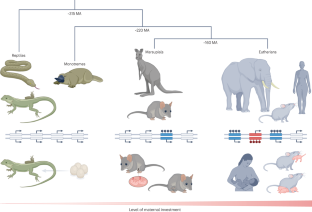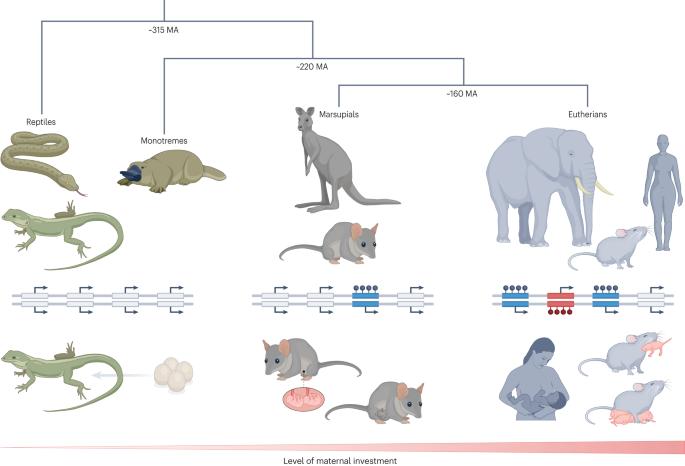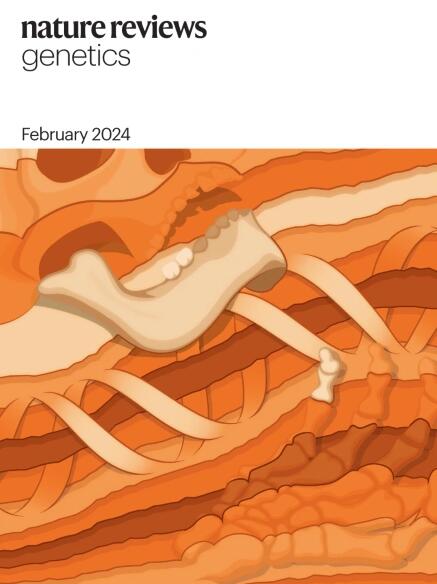Imprinted genes and the manipulation of parenting in mammals
IF 39.1
1区 生物学
Q1 GENETICS & HEREDITY
引用次数: 0
Abstract
Genomic imprinting refers to the parent-of-origin expression of genes, which originates from epigenetic events in the mammalian germ line. The evolution of imprinting may reflect a conflict over resource allocation early in life, with silencing of paternal genes in offspring soliciting increased maternal provision and silencing of maternal genes limiting demands on the mother. Parental caregiving has been identified as an area of potential conflict, with several imprinted genes serendipitously found to directly influence the quality of maternal care. Recent systems biology approaches, based on single-cell RNA sequencing data, support a more deliberate relationship, which is reinforced by the finding that imprinted genes expressed in the offspring influence the quality of maternal caregiving. These bidirectional, reiterative relationships between parents and their offspring are critical both for short-term survival and for lifelong wellbeing, with clear implications for human health. Genomic imprinting — the monoallelic expression of genes based on their parent of origin — may have evolved due to an intragenomic conflict between maternal and paternal genomes within an individual, with differential interests regarding the level of parental caregiving. Here, the authors review the influence of genomic imprinting on parenting behaviour in mammals, with a focus on studies in mice.


哺乳动物的印记基因和养育子女的操作。
基因组印记是指基因的亲本表达,源于哺乳动物生殖系中的表观遗传事件。印记的进化可能反映了生命早期在资源分配上的冲突,后代中父亲基因的沉默会增加母亲的供给,而母亲基因的沉默则会限制对母亲的需求。父母护理已被确定为一个潜在冲突的领域,偶然发现几个印记基因直接影响产妇护理的质量。最近基于单细胞RNA测序数据的系统生物学方法支持了一种更为深思熟虑的关系,这一关系因发现后代中表达的印记基因会影响母亲护理的质量而得到加强。父母和子女之间的这种双向、反复的关系对短期生存和终身幸福都至关重要,对人类健康有着明确的影响。
本文章由计算机程序翻译,如有差异,请以英文原文为准。
求助全文
约1分钟内获得全文
求助全文
来源期刊

Nature Reviews Genetics
生物-遗传学
CiteScore
57.40
自引率
0.50%
发文量
113
审稿时长
6-12 weeks
期刊介绍:
At Nature Reviews Genetics, our goal is to be the leading source of reviews and commentaries for the scientific communities we serve. We are dedicated to publishing authoritative articles that are easily accessible to our readers. We believe in enhancing our articles with clear and understandable figures, tables, and other display items. Our aim is to provide an unparalleled service to authors, referees, and readers, and we are committed to maximizing the usefulness and impact of each article we publish.
Within our journal, we publish a range of content including Research Highlights, Comments, Reviews, and Perspectives that are relevant to geneticists and genomicists. With our broad scope, we ensure that the articles we publish reach the widest possible audience.
As part of the Nature Reviews portfolio of journals, we strive to uphold the high standards and reputation associated with this esteemed collection of publications.
 求助内容:
求助内容: 应助结果提醒方式:
应助结果提醒方式:


